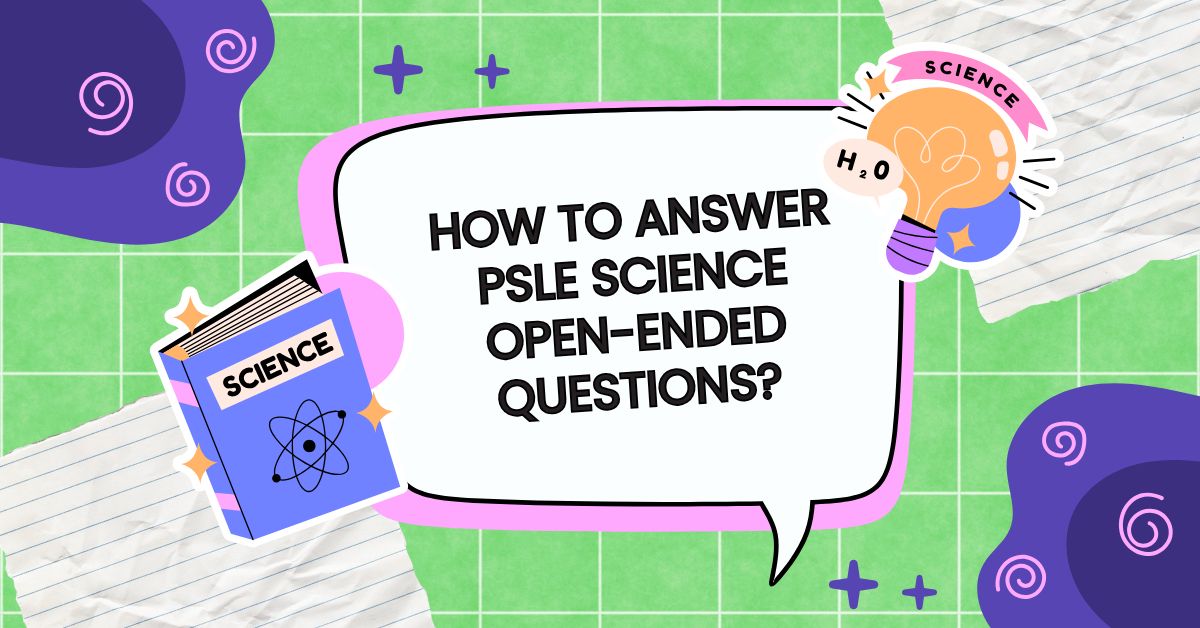Open-ended questions in the PSLE Science paper can be tricky. They demand not just understanding, but also clarity, precision, and the ability to explain scientific concepts effectively. While many students excel in multiple-choice questions, open-ended questions are often where valuable marks are lost.
In this blog, we’ll walk you through how to master these questions, step-by-step with proven techniques, common pitfalls to avoid, and expert tips that will boost your child’s confidence and performance.
Why Are Open-Ended Questions Important in PSLE Science?
Open-ended questions test a student’s ability to:
- Apply scientific concepts in real-world scenarios
- Express ideas using accurate scientific vocabulary
- Structure responses clearly and logically
Unlike multiple-choice questions, these require written answers and often award marks for explanation, application, and detail. Even if the student knows the correct concept, poor phrasing or vague answers can result in lost marks.
Common Types of PSLE Science Open-Ended Questions
Before jumping into how to answer them, it’s essential to recognise the different types of questions your child might face:
Explain-based Questions – e.g., “Why does the balloon expand when heated?”
Prediction Questions – e.g., “What will happen if plant B does not receive sunlight?”
Experimental Setup Questions – e.g., “Suggest one improvement to the experiment shown.”
Comparison Questions – e.g., “Compare the rate of evaporation in setup A and B.”
Each of these types requires a slightly different answering technique.
How to Answer PSLE Science Open-Ended Questions Effectively
Here are tried-and-tested steps your child can follow:
1. Understand the Question Thoroughly
Read the question carefully.
Identify keywords like explain, suggest, compare, or why.
Underline important information or data in diagrams.
2. Apply the CUE Method
CUE stands for Concept, Use of Keywords, and Explanation.
Concept: Identify the correct scientific principle.
Use of Keywords: Use appropriate scientific vocabulary (e.g., condensation, gravity, reproduction).
Explanation: Justify the answer with a cause-and-effect relationship.
Example:
Q: Why does water collect on the outer surface of a cold glass of water?
A (CUE method):
Concept – Condensation occurs.
Keywords – Water vapour, condensation.
Explanation – Water vapour in the air loses heat to the cold glass and condenses into water droplets on the outer surface.
3. Answer in Full Sentences
Avoid one-word answers. Full sentences show understanding and help the examiner follow your logic.
4. Structure Your Answer
Keep it clear and concise.
If the question has multiple parts (e.g., “State and explain”), number your answers accordingly.
5. Avoid Vague Words
Replace “it”, “thing”, or “stuff” with accurate scientific terms. For example, use carbon dioxide instead of “it”.
6. Use Scientific Diagrams (if allowed)
Some questions may permit or even encourage drawing simple labeled diagrams to support the explanation.
Common Mistakes to Avoid
Memorising without understanding: Rote learning doesn’t help when questions require application.
Wrong or missing keywords: Even a right concept with wrong terms may lose marks.
Too lengthy or off-topic answers: Stay focused and relevant.
Overwriting: Don’t overwrite the original answer unless you are confident it’s incorrect.
Sample Question & Model Answer
Question: Setup A has a plant placed under sunlight. Set up B has the same plant kept in a dark cupboard. After 3 days, only plant A shows healthy growth. Why?
Model Answer:
Plant A receives sunlight, which is essential for photosynthesis. Photosynthesis enables the plant to make food. Plant B, kept in the dark, cannot perform photosynthesis and therefore does not grow well.
Bonus: PSLE Science Open-Ended Question Checklist
Before submitting PSLE answers, students should ask themselves:
- Have I identified the correct concept?
- Did I use the right keywords?
- Is my explanation complete and logical?
- Did I write in full sentences?
- Did I stay within the question’s context?
Final Tips for Parents and Students
Practice is Key: Encourage regular, timed practice using past-year questions.
Review Together: Go over your child’s answers and guide them in using scientific language.
Seek Expert Help: If your child is consistently struggling, personalised guidance can make a big difference.
How Explico Can Help
At Explico, our PSLE Science tutors are trained to help students:
- Master open-ended question strategies
- Improve their written explanations using real-life examples
- Gain confidence through personalised feedback and mock tests
Whether your child needs help with foundational concepts or exam techniques, our online learning platform makes high-quality education accessible anytime, anywhere in Singapore.
Ready to Improve Your Child’s Science Score?
Join Explico’s PSLE Science Mastery Programme and equip your child with the skills to answer open-ended questions like a pro.
Contact us to book a Free Trial Lesson Today!


